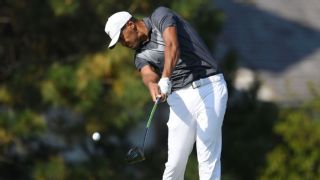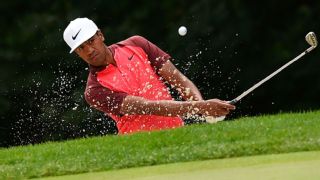|
ATLANTA -- Even now, Gary Finau can't explain it. He's walking down the perfectly manicured 18th fairway at East Lake Golf Club, host of this week's Tour Championship, where the FedEx Cup champion will receive an eight-figure paycheck and even the last-place finisher will bank a total well into the six digits while pocketing invitations into each of next year's major championships. His son, Tony, the third-oldest of eight children who grew up in their Rose Park, Utah, home, is just a few yards away, taking a mighty lash at his golf ball toward the final green. It's a scene Gary has been watching for 20 years. But he still shakes his head in wonderment about how it has all unfolded. "This is the sport that we used to talk about like, if you ever see me at a golf course, shoot me," he says with a gregarious laugh. "Why would anybody go chase a little white ball into a hole? So we stayed far away. We thought playing golf was like going to your grave." The story of how he became the first golf instructor to a player who is now 28, ranked 53rd in the world and will embark on his first Masters appearance in April is one that sounds even too far-fetched for a Hollywood script. Gary grew up in Tonga, playing rugby, cricket and football. When he immigrated to the United States at age 12, he fell in love with basketball and boxing. As Tony explains, "Golf in the Polynesian culture was just so out of the zone. Nobody plays golf. Everybody thought only girls or old rich white men play that sport." It became part of their lives less by choice than happenstance. The first tournament Tony recalls watching with his brother Gipper, who's 11 months younger, was the 1997 Masters. A baby-faced Tiger Woods eviscerated the field that week, and the two boys in the hardscrabble neighborhood just northwest of Salt Lake City were among the millions who took notice. "To see him do what he did, I could relate to him," Tony says. "Obviously how exciting he was, but someone with a bit of color playing this game. That's when I was like, maybe I can play golf. If he can do it, so can I." Within a few months, Tony's mother, Ravena, implored Gary to find a hobby with the boys. The rationale was twofold: There would be critical father-son bonding time, but it would also keep the young boys out of the neighborhood and out of the trouble that always lurked there.  They offered them two nontraditional options: golf or tennis. Still starry-eyed from watching Tiger, they chose the former. That wasn't the entire reason, though. The boys figured if they got good enough to play in tournaments, they could make their dad play caddie. The insidious thought of watching Gary lug a bag of clubs around a golf course was enough to cinch their decision. So off they went to Jordan River, a par-3 facility where the first hole was 160 yards and none were longer. Gary would bark instructions despite his limited initiation into the game. "He was still learning the game like we were," Tony recalls. "Looking back, he was blindly teaching us to play golf." That was true, but he did know math. "I used to drive them every day after school to the football field," Gary says. "Stop there so they could see all their friends -- 400 or 500 kids practicing Pop Warner football. I said, 'Where is everybody?' They'd say, 'Right here.' Then we'd drive up to the golf course. I'd say, 'Who's here?' They'd say, 'Nobody.' I'd tell them, 'Exactly. Your percentage to make it in golf is way better, boys. There's no competition here. So let's practice.' " And they did, nearly every day, for hours on end. Gary was the coach, Ravena was the motivator, the one who constantly assured them that they could accomplish anything. The family didn't have the financial means to afford daily rounds of golf, so Gary improvised. Knowing it didn't cost anything to use the chipping and putting area, he'd collect old range balls and the boys would practice until sundown. Soon enough, the pro at Jordan River took notice of their work ethic. He offered up the course, free of charge, whenever they wanted. The boys took advantage, often playing two or three rounds each day after school. They became really good, really fast. Soon they started to travel the country to play tournaments. Gary worked a night shift for Delta Airlines, so airfare wasn't a problem. To assuage the cost of hotels and rental cars, the boys took a part-time job. Fire-knife dancing is popular in the Polynesian culture. It's exactly what it sounds like, with knives attached to the ends of sticks, covered in material set aflame, all while being furiously spun around by a performer. They'd been practicing the art since they could walk -- and Tony, especially, was extraordinarily talented. Named after his mother's brother, who was a world-class fire-knife dancer, Tony entered junior competitions and would regularly defeat much older, more experienced kids. "It's second nature to me, just like riding a bike," he explains. "I pick up a stick and I can still spin it pretty well."  Some kids had paper routes. The Finau boys would hold fundraisers, luaus and parties during which they would perform fire-knife dances and might collect a few hundred dollars to help alleviate the travel expenses at tournaments. It opened up a whole new world outside of Rose Park. They didn't just compete against some of the world's best young golfers, they got to know them. At Doral one year, they befriended a boy from Northern Ireland named Rory McIlroy, who would later spend time in Utah with them during the summer months. When he was 12, Tony won the Junior World Championships in San Diego for his age division. He still considers that a major turning point in bridging the gap between golf as a hobby and as a potential career. "I looked at the banners and saw the names -- Tiger Woods, Phil Mickelson, Ernie Els, all these guys," he remembers. "Then I saw my name. I said, 'Why not me? I can make it, too.' That really motivated me on another level. I started thinking, I can take this really seriously and accomplish some big things in this game." Fast-forward to today and Tony has already accomplished some big things. Last season, he won his first PGA Tour title at the Puerto Rico Open. This season, he has compiled seven top-10s in 28 starts, including a nerve-wracking share of seventh place at last week's BMW Championship. Following a disappointing conclusion to his third round, Tony was outside the projected top 30 to advance to the season finale. The next day, he chipped in for birdie on the final hole to post a 7-under 64 and reach the field at East Lake, a victory in itself because of the impending perks it guarantees. "It was really a special round on Sunday, kind of an 11th hour thing to get in," he says. "I knew what I had to do and to make it happen was pretty cool. Something I'll remember for the rest of my career, for sure." It's a career that will undoubtedly include much more success for a guy with a growing reputation as one of the game's most gifted players. None other than three-time major champion Jordan Spieth says of him, "Tony Finau is an unbelievably talented player who's probably going to win, I think, dozens of times out here. He is really, really good and very underrated, in my opinion." It wasn't all so easy. He didn't transition from learning the game at Jordan River to winning junior tournaments to competing in the Tour Championship without a heaping dose of strife. On Nov. 27, 2011, Ravena died in a car accident. The mother who had been so influential as a positive presence in her children's lives was returning from a wedding in California when she was killed near the small town of Elko, Nevada. Tony was 22 at the time, a professional for five years already but still learning the game while toiling on the mini-tours. "It was very personal for him," Gary says. "Out of all the kids, he was mommy's boy." One day after Ravena's death, Tony and girlfriend Alayna -- now his wife -- welcomed their first son, Jraice. Within months, while still mourning and living in a small apartment with his growing family, Tony developed a stomach ulcer. "Since she passed away, there's not a day that goes by that I don't think about her," he says. "Now that I'm a parent myself, I understand what my parents went through and what they sacrificed, just to put me in this position. I think she'd be proud if she was here and could see me accomplish some of the things I've accomplished. I think she'd be really proud." There is no specific blueprint for how -- or why, or when -- a professional golfer will springboard into the next echelon. There is no singular determinant for a player shifting his game into an extra gear and becoming one of the world's best. It's not all about intangibles, though. By reaching the Tour Championship field for the first time, Finau will own the luxury of being able to set his schedule for the upcoming season. He'll be immediately qualified into each of the game's biggest tournaments, at least offering the opportunity of making that leap. "One of the major goals this season was to get into the Tour Championship, because of the perks," says his longtime instructor, Boyd Summerhays. "But it's not just the perks, it's the next step in his career. The way he's playing, that's where he's been trying to base his game. He wants to win a major championship -- and you can't win it if you're not in it." Of the 30 competitors in this week's field, Finau is the lone player who this week earned his maiden voyage down Magnolia Lane next April. He has been invited to watch the Masters Tournament before; he has been invited to play Augusta National. But he has turned down the offers every time, instead explaining that he doesn't want to walk in the footsteps of Tiger Woods from that first tournament he'd ever watched 20 years ago until he could take a similar journey. "I have goosebumps," he admits, "just thinking about it." As for Gary, the man who knew nothing about the game when he first took his boys to Jordan River, which now exists as only a disc-golf course, he struggles to describe how he'll feel making that drive with Tony, arriving at Augusta National with his son an invited participant. "The experience of realizing that you can bend down and kiss that ground ..." he says, his voice trailing off into the late-afternoon sun. "This is real. You got here. It's possible." He thinks back to those early days. There were no other Polynesian fathers -- not in Rose Park, at least -- who saw golf as a future for their sons. No others who saw it as an escape from the troubles in their neighborhood to a more indulgent lifestyle. "We don't fit any mold of why we're here, why we're playing this game," he explains. "It's not that easy. He's first-generation. I had no interest in the game. That's what I think about. How the heck did this happen? I don't even know how we did it."
|
